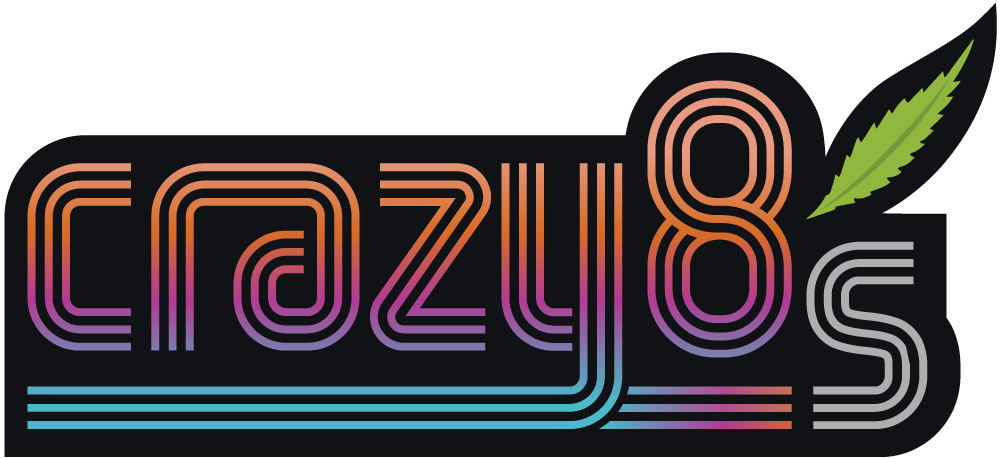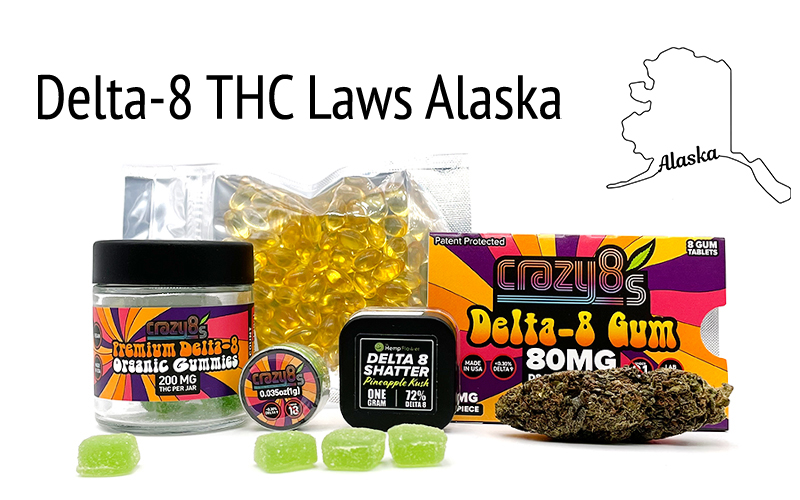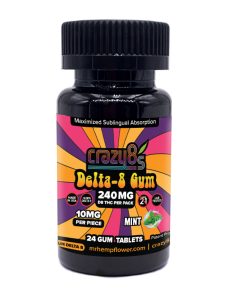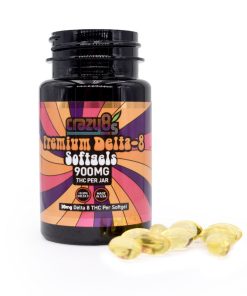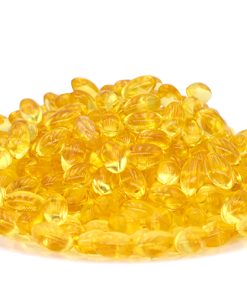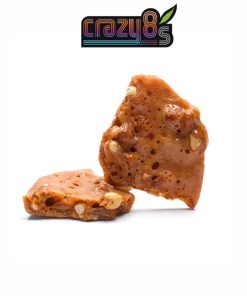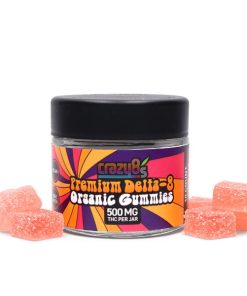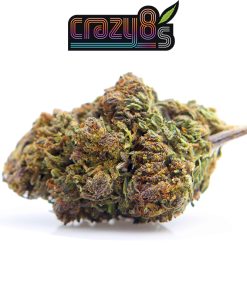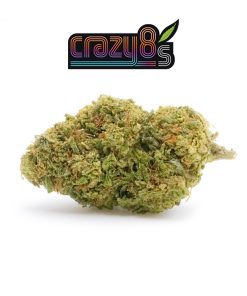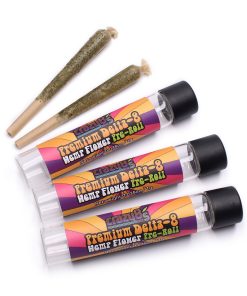Delta 8
Recreational Cannabis is Legal in Alaska — What Does That Mean for Delta 8 THC
You can grow a few grams of weed in your Alaskan home but can’t buy delta 8 THC products. The Last Frontier was not quick to amend and align its hemp laws with the Farm Bill — which permits the sale of all hemp cannabinoids. Let’s talk about the legal status of Δ8-THC in Alaska & its future in the Last Frontier.
Is Delta 8 THC Legal in Alaska?
Delta 8 THC is illegal in Alaska. The state classifies tetrahydrocannabinols and all isomers Schedule III Controlled Substances.
What is Delta 8 THC?
Delta 8 THC products exploded onto the scene, so here’s what you need to know about this cannabinoid. Delta 8 is a rare cannabinoid found in hemp and marijuana in varying concentrations. In hemp, it’s present in less than 1% of its total cannabinoid profile — and is typically a result of delta 9 THC degradation.
This cannabinoid can be extracted from the hemp plant, but it’s typically converted from CBD and used to create different products. This compound is psychotropic and will get you “high.” But, its effects are described as less intense than a delta 9 high. Research shows that Δ8-THC works directly with the endocannabinoid system, affecting sleep, pain, anxiety, and nausea.
Buying Delta 8 THC in Alaska
Unfortunately, you can’t purchase Δ8-THC in Alaska legally because all THC and its isomers are illegal in the Last Frontier. There’s room for change, considering recreational marijuana is legal in Alaska, but until that happens, you should stick to products with no delta 8 THC.
When starting with delta 8 THC products, choosing purity, potency, and quality is essential.
Crazy8s specializes in extracts that tick all those boxes and actually work. We have over six years of experience and close relationships with hemp farmers who grow organic crops. So, our extracts are made from organic hemp harvested from local USA farms and are tested several times during manufacture by third-party, certified labs.
Gummies are ideal for anyone looking to start their Δ8-THC journey. The Crazy8s Delta 8 THC Gummies are a vegan-friendly, natural formula available in two strengths, 10mg and 50mg.
If you’re worried about tasting a hempy flavor in products, worry not, you won’t even sense the hemp extract in them. These gummies come in two flavors, Passion Fruit and Black Cherry Vanilla — so they are delicious and of excellent quality.
Is Delta 8 THC Legal in Alaska?
Delta 8 THC is illegal in Alaska. State laws ban the distribution, sale, and consumption of delta 8 THC.
As stated in Alaska Statutes, tetrahydrocannabinols and all isomers (including delta 8 THC) are Schedule III Controlled Substances.
These provisions go against federal law or the Farm Bill of 2018, which legalized hemp and all hemp derivatives. The bill effectively excluded ‘THC in hemp’ from the list of controlled substances, legalizing hemp-derived delta 8 products with no more than 0.3% delta 9 THC.
Recreational cannabis or possession of small amounts of cannabis is legal in Alaska. The state allows adults to grow a maximum of 113 grams of weed in private homes. Residents can also carry up to 28 grams of weed in public. More than that is punished with a fine and/or prison time.
What Does the Future Hold?
Recreational cannabis is legal in Alaska, but the state has outdated laws that ban the sale and consumption of Δ8-THC. Such laws contradict the Farm Bill of 2018, which removed ‘THC in hemp’ from the list of controlled substances. But, as the nation is growing more interested in cannabis, a change in laws is more than likely.
Since cannabis is legal in Alaska, it’s also possible that the state will regulate hemp-derived Δ8-THC under its marijuana program.
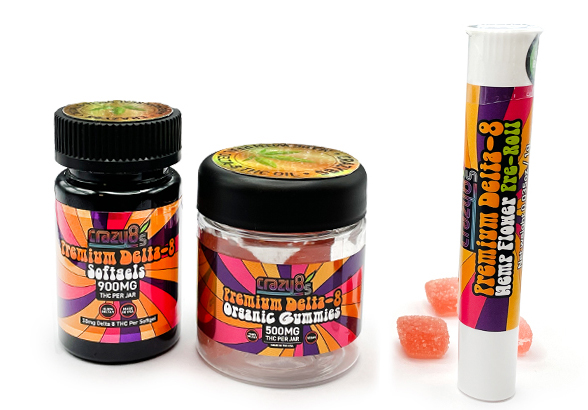
Is Delta 8 THC Legal Federally?
The legality of Δ8-THC on a federal level remains murky. The Farm Bill of 2018 legalized hemp and hemp cannabinoids, derivatives, and extracts for commercial purposes — but the industry continues to operate without any regulatory authority.
As new cannabinoids started to appear, loopholes emerged. The most talked-about loophole is Δ8-THC made from cannabidiol (CBD). Delta 8 users know that this cannabinoid is found in trace amounts in hemp, so extracting it directly from the plant is a challenge and not financially viable. So, they create it in a lab from hemp-derived cannabidiol (CBD), and this process makes it fall into a gray legal area.
Delta 8 derived from CBD is made by combining non-cannabis (solvents) and cannabis (hemp-derived CBD) materials. In a response letter sent to the Alabama Board of Pharmacy, the DEA stated that to be considered illegal, Δ8-THC “must be synthetically produced from non-cannabis material.” It’s clear that Δ8-THC ‘s true nature is not fully captured by this definition because it falls between “synthetic” and “natural.”
In addition, the letter confirmed that “cannabinoids extracted from the cannabis plant that have a Δ9-THC concentration of not more than 0.3 percent on a dry weight basis meet the definition of ‘hemp’ and thus are not controlled under the CSA.” Solely by this definition, Δ8-THC is a legal substance under federal law if extracted directly from hemp.
Due to a lack of regulatory initiative by federal agencies, states have taken action to legalize, restrict, or ban Δ8-THC. Although federal agencies are aware of the spread of this cannabinoid, they still haven’t taken any steps to ban it. The FDA recently issued a warning letter on the dangers of these products, but consumers continue to buy cheap and low-quality items.
No, delta 8 THC is not legal to buy in Alaska. The state classifies tetrahydrocannabinols and all isomers Schedule III Controlled Substances.
It’s not. The manufacture, sale, and distribution of delta 8 is illegal in Alaska.
In delta 8 friendly states, you can. But, because Alaska law classifies all hemp cannabinoids, it’s best to avoid ordering online.
Unfortunately, it’s not. Currently, 18 states have banned or restricted this cannabinoid, including Alaska.
Read our legal disclaimer HERE. While we try to stay as up to date as possible on all state laws, you should do your own due diligence and work with a legal professional to ensure you are operating legally in your state or territory at all times.
